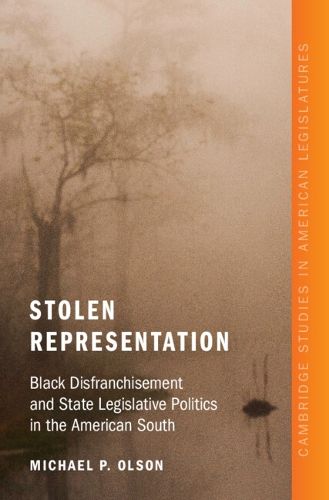Readings Newsletter
Become a Readings Member to make your shopping experience even easier.
Sign in or sign up for free!
You’re not far away from qualifying for FREE standard shipping within Australia
You’ve qualified for FREE standard shipping within Australia
The cart is loading…






In the decades after Reconstruction, African Americans were systematically removed from the electorate in the American South using tools such as poll taxes and literacy tests. Stolen Representation draws on significant amounts of new historical data to explore how these tools of Black disfranchisement shaped state legislative politics in the American South. The book draws on contemporary scholarship to develop theoretical arguments for how disfranchisement plausibly affected roll-call voting, committee assignments, and policymaking activity in southern state legislatures, and uses rich data on each of these areas to demonstrate disfranchisement's profound effects. By analyzing state legislative data and drawing on historical sources to help characterize the nature of politics in each state in the period around disfranchisement, Olson offers a nuanced, context-driven exploration of disfranchisement's effects, making a major contribution to our understanding of the relationship between racial discrimination at the ballot box and public policymaking in the United States.
$9.00 standard shipping within Australia
FREE standard shipping within Australia for orders over $100.00
Express & International shipping calculated at checkout
Stock availability can be subject to change without notice. We recommend calling the shop or contacting our online team to check availability of low stock items. Please see our Shopping Online page for more details.
In the decades after Reconstruction, African Americans were systematically removed from the electorate in the American South using tools such as poll taxes and literacy tests. Stolen Representation draws on significant amounts of new historical data to explore how these tools of Black disfranchisement shaped state legislative politics in the American South. The book draws on contemporary scholarship to develop theoretical arguments for how disfranchisement plausibly affected roll-call voting, committee assignments, and policymaking activity in southern state legislatures, and uses rich data on each of these areas to demonstrate disfranchisement's profound effects. By analyzing state legislative data and drawing on historical sources to help characterize the nature of politics in each state in the period around disfranchisement, Olson offers a nuanced, context-driven exploration of disfranchisement's effects, making a major contribution to our understanding of the relationship between racial discrimination at the ballot box and public policymaking in the United States.